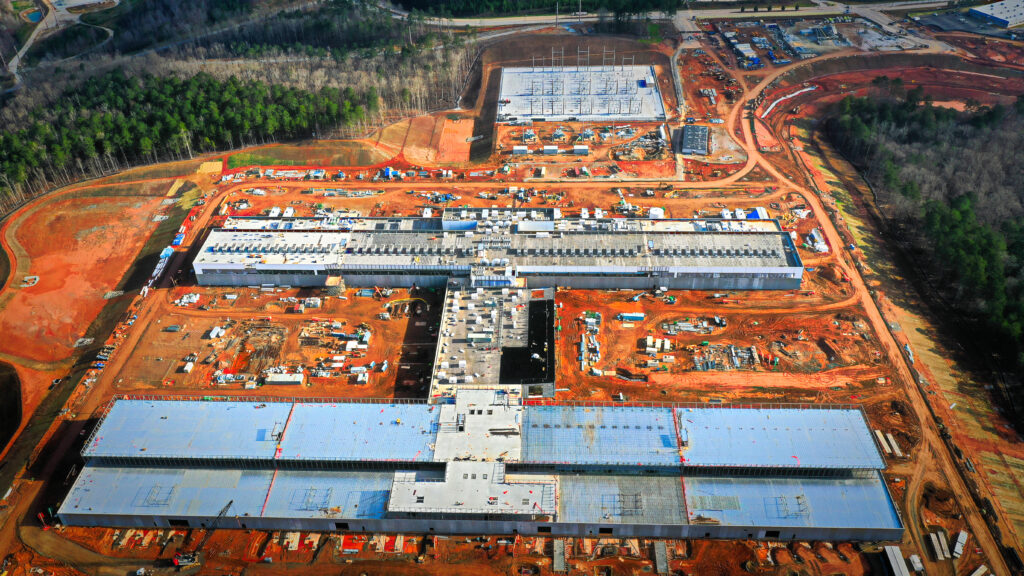In the last episode of The Modern Data Center Journal Podcast, we launched a new series exploring some of North America’s hottest data center markets with a look at Phoenix, AZ. We’re now continuing that series with a deep dive into another southern city on the opposite side of the country—Atlanta.

Today, Atlanta is anything but a secondary data center market. According to CBRE’s North America Data Center Trends Report for H2 2023, Atlanta has experienced an incredible 118 percent data center inventory growth since 2020.
And that growth isn’t stopping. At the time the report was released, the city had an additional 732.6 MW of data center capacity under construction. But what is driving this immense growth in the Peach State? And what – if anything – could possibly slow it down?
To find out, we sat down with Oscar Gross, the Account Manager for the Atlanta Region at Compu Dynamics. During our podcast discussion, we asked Oscar about the trends driving colocation providers and hyperscalers to Atlanta, what makes the city stand out in America’s Southeast, and what challenges data center owners and operators might face in this region in the future.
Click “PLAY” to listen to the episode in its entirety, or scroll down to read a transcript of the conversation.
Transcript: Modern Data Center Journal Podcast (Season 1, Episode 3):
Ryan Schradin: Hello, and welcome to The Modern Data Center Journal Podcast, your home for exciting discussions about the data center industry.
On this program we talk about the technological advancements being driven by modern data centers, explore the ways new technologies and workloads are shifting and changing the traditional data center as we know it, and discuss exciting new advancements in the equipment and devices inside and outside the envelope. We also feature deep data center discussions with industry leaders who know the space better than anyone.
My name is Ryan Schradin, and I’m the executive editor of The Modern Data Center Journal. I’ll be your host for today’s show. And today, I’m joined by a very exciting guest. He’s Compu Dynamics’ account manager for the Atlanta region. I’m pleased to welcome Oscar Gross to the show.
Oscar, thanks so much for joining us on the program.
Oscar Gross: Hey, Ryan, how are you? Thank you so much for having me. It’s a pleasure to be here, sir.
Ryan Schradin: I’m doing well and super excited to have you on, although, it is a little bit of a gray day here. Hopefully, it’s a little sunnier where you’re at.
Oscar Gross: Negative… It’s pretty gray as well.
Ryan Schradin: It’s bleak everywhere. Well, hey, let’s talk about something a little happier, than. Let’s talk about a hot data center market.
In our last episode, we sat down with an associate of yours at Compu Dynamics, Ruben Garcia. We dished about one particular hot data center market, Phoenix, Arizona., No pun intended, I know it’s hot for numerous reasons.
I’m excited to have you here today to teach us a little bit about another data center market that’s getting a lot of attention,. and that is—Hotlanta.
So let’s jump in… Is there a lot of existing capacity in Atlanta? Or are there a lot of new data centers being built there right now? What’s it like when it comes to data centers in Atlanta right now?
Oscar Gross: Hotlanta! I like the intro! So, Hotlanta, as you called it, is a hot data center market for sure. It is not a secondary data center market anymore. It’s right up there with the big boys.
So, for a long time, Atlanta was a hidden gem. But now, the absorption rate in this market in the last two years has been enormous. The data center capacity in Atlanta is set to triple in the next three years.
Many of the big hyperscalers and colos are building in Atlanta, and, believe it or not, the majority of what is being built is already pre-leased.
Ryan Schradin: Wow, they’re leasing it faster than they can build it!
So, you mentioned the hyperscalers. You mentioned the “colos,” or colocation providers for folks who don’t know the lingo. But, they don’t just build without there being a demand signal somewhere, right? If there’s no demand for that data center space, they’re not going to buy land and put shovels in the ground.
So, where’s that demand signal coming from when it comes to Atlanta? What’s driving them to build those data centers there?
Oscar Gross: Well, it’s a trend that extends well beyond Atlanta. Let’s talk about the size of the digital economy, which is humongous.
[The digital economy] is estimated to be a ten trillion dollar economy by 2030. That’s trillion, with a “T.”
That’s driven by online retail, social media, banking, entertainment, and all these major drivers that are creating an enormous amount of demand for data centers. And this demand has saturated some of the primary markets, most particularly Northern Virginia’s Loudoun County.
There’s a scarcity of land to build data centers. So, Atlanta—which was this well-kept secret for a long time—started to be discovered as all these colocation and hyperscale providers moved south to Atlanta. So, I think that’s been the biggest driver.
Ryan Schradin: You mentioned that this is a broader digital economy thing, right? There’s so much demand for digital services out there right now, but there are a lot of other cities in the south that we could build a data center in, right?
Why Atlanta? Why not Savannah or Tampa? I’m just throwing random southern cities out here. Why Atlanta versus anywhere else in the South to meet that digital demand?
Oscar Gross: There are data centers being built in some of the locations you mentioned, but Atlanta is such an attractive place for data centers. Atlanta is in the heart of the Southeast. It’s right in the middle of all the major states in the Southeast, like North Carolina, South Carolina, Tennessee, Alabama, Florida, and so forth. It’s right here in this great location. It’s free of any major natural disasters.
For example, you’re not going to see a big earthquake coming through Atlanta. We do get crummy weather, like today. But for the most part, it’s a great place to live. It’s a very desirable place to live, with a great quality of life.
We’ve got a fantastic labor force, great schools, and some of the best technical schools in the country, such as Georgia Tech, UGA, and Emory. So, there’s a great labor force, as well.
Atlanta is also home to some of the major Fortune 500 companies in transportation, media, retail, and food and beverage. I can go on and on about the benefits of Atlanta, but it’s got affordable land and wind power. And to put the icing on the cake, there are fantastic tax incentives to build data centers in the region.
Ryan Schradin: You mentioned something there that I want to zero in on a little bit. I’ve worked with many colocation providers in the past. We’ve talked to them about site selection and picking markets.
Now, I know this has changed a little bit,. but in some of my early discussions, when we talked about site selection and picking markets, it was always, “We’re looking for cheap power, available land, and connectivity.” Those were always the Holy Trinity, if you will, of what they were looking for.
How does Atlanta stack up in those three things? Are power, land, and connectivity all in abundance? Where are we at in Atlanta with those three things?
Oscar Gross: So, there’s plenty of land… We’re not constrained in that sense.
Connectivity is growing, but the big question is the power, right? And that’s not typical to Atlanta, that’s across the board. If you can find power or land with power, you can build connectivity. It’s one hundred times more expensive to bring power [to a campus] than to bring fiber to a piece of property.
So, that is one thing that’s holding back this massive digital economy—the power. But if you were to talk about all those three things, the key thing is to find the land with power.
Ryan Schradin: That sounds like that could be a challenge. So, let’s dig into the challenges a little bit. Every data center market has a challenge, right?
I personally live here in Virginia, and I know the Northern Virginia data center market. Available land is a problem, and I understand that power is becoming a problem here, as well.
So, what’s the challenge in Atlanta or the broader Georgia area, in general? Is it that power is the big challenge? What would you say is the big challenge in this market? Because it seems like there’s always one, right?
Oscar Gross: Right! You mentioned Northern Virginia and Loudoun County. With Loudoun County, for example, every data center in Northern Virginia has been built in that area. And when you’ve got too much of one thing, that’s not great. I think it’s been great for the economy and the county, but when you’ve got too much, it tends to be too much.
If I had to pinpoint one challenge you have mentioned, it’s the power, and that’s the same everywhere. But in particular, Georgia Power will struggle to keep up with the massive demand of the data center that the data center is requiring. The other thing is labor.
When you’ve got so many data centers, and not just data centers, but hospitals and other sectors of the economy that are growing, finding the skilled labor that’s required to build and operate a data center is going to create challenges, as well.
Ryan Schradin: I always like to wrap up these data center market spotlights by having you pull your crystal ball out and think about where we’re going to be. Put on your prognosticator’s hat. Where are we three years, five years, maybe even a decade from now in Atlanta?
Will we reach market saturation? Do we see this slowing down anytime soon as far as the amount of data centers being constructed? Where do we go from here? What does the data center market look like in Atlanta in the future?
Oscar Gross: So, I’m going to say that Atlanta is open for business in the data center market, without a doubt.
Just recently, as of last week, our governor vetoed the bill that would have eliminated tax incentives for this market. So, that created a relief and it told the world that Atlanta is pro-business, when it comes to data centers.
Now, keeping up with the power, labor, and that demand is what’s going to slow this market down, in my opinion. But if I were to guess, Atlanta has tripled in capacity in the last few years. I believe it’s going to triple again in the next three years. It’s a major market that’s driving a lot of new existing customers to build more demand here.
So, it’s open for business and is going to keep growing.
Ryan Schradin: It’s open for business. It’s tripled already, and it could triple again!The only things that might slow it down are power and labor, from what I’m hearing you say.
Oscar Gross: Ten-four, sir!
Ryan Schradin: Well Oscar, this has been really cool. It’s been incredible having you on the podcast. I’ve learned a lot about the Atlanta data center market and I’m sure our listeners are coming away with a much better understanding of Atlanta.
So, I want to thank you for taking the time to educate us and tell us a little bit about the Hotlanta data center market.
Oscar Gross: The pleasure is all mine. Thank you for having me on the show.
Ryan Schradin: Thank you guys so much for joining us on this episode of The Modern Data Center Journal Podcast!
